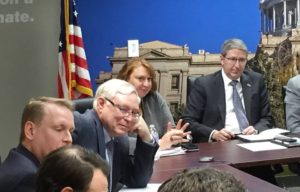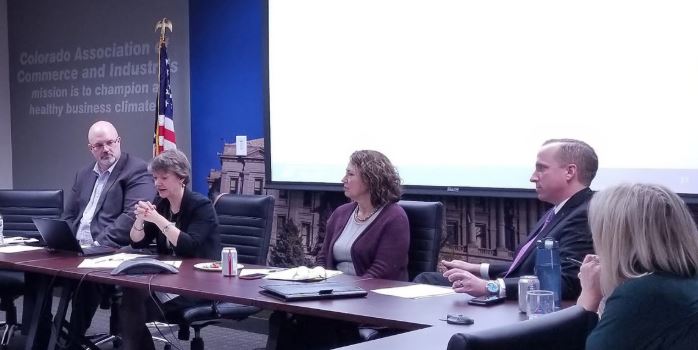In this Capitol Report:
Department of Revenue Tax Team Meets with Colorado Chamber Tax Council
This week, the Department of Revenue (DOR) tax team spoke to the Tax Council regarding several legislative and regulatory tax related issues that affect businesses across the state. The guest speakers included:
- Matthew Scott, Director, Division of Taxation, CO Department of Revenue
- Brendon Reese, Deputy Director, Taxation Policy & Legal Analysis, CO Department of Revenue
- Jean Robinson, Legislative Liaison, CO Department of Revenue
The meeting was focused on the recent tax regulations and legislation prompted by the U.S. Supreme Court decision in South Dakota v. Wayfair; an update on the request for proposals for a state-run tax simplification system; and discussion regarding proposed tax legislation during the 2019 Legislative Session.
- Dakota v. Wayfair Regulations :
During the meeting, DOR staff discussed the decision to delay implementation of the Wayfair rules until May 31, 2019. The rules were originally intended to go into effect on December 1, 2018. In the meantime, businesses may continue to follow the existing rules without penalty, or they may choose to comply with Department’s new emergency rules.
Many questions were raised to the DOR staff including: internal system changes; access to address locators; the current branch ID system and license requirements for non-physical locations. DOR shared that they would be making some adjustments to the tax return filing process and will also provide training to taxpayers for compliance with the new rules. Additional sources of information can be found at www.colorado.gov/pacific/tax. DOR staff also shared that they requested state funding for a GIS address locator system however, that request has not been approved by the Office of State Planning & Budgeting which is responsible for reviewing/approving state agency funding requests. The Department also agreed to check on the possibility of eliminating the current branch ID system to help simplify the current reporting system for businesses.
Staff agreed to continue to work with the Tax Council on legislative ideas to address some of the complexities in implementing the Wayfair decision. However, the challenges include constitutional and commerce clause restrictions that are difficult to navigate in any proposed legislation. Other legislation that was discussed and that will be pursued by the Department includes:
E-Filing:
This legislation would require e-filing for all forms of taxes. A taxpayer that has a tax liability in an annual period above the following thresholds would be required to both file and pay electronically:
For periods on or after:
- January 1, 2020, prior tax year or expected current year tax liability of $20,000;
- January 1, 2021, prior tax year or expected current year tax liability of $10,000;
- January 1, 2022, prior tax year or expected current year tax liability of $5,000;
- January 1, 2023, prior tax year or expected current year tax liability of $500.
Tax Simplification System:
This legislation would:
- Allow DOR to conduct a sourcing method to develop a sales & use tax simplification system;
- Once system is online, DOR would accept any state sales & use tax returns & payments;
- Require at least 3 home rule jurisdictions voluntarily use the system;
- after 3 years of the effective date, all home rule jurisdictions would voluntarily use the system;
- the funding source is yet to be determined for funding this system.
Please contact Loren Furman at [email protected] or at 303-866-9642 with any questions regarding Tax Council issues. The next Colorado Chamber Tax Council meeting will be held on January 11, 2019 and if you are interested in attending, please RSVP to [email protected].
Thank you!
Colorado Chamber Health Care Council Hears from State Leaders on Health Care Cost Priorities
This week, Health Care Council members had the opportunity to meet with Commissioner of Insurance, Mike Conway, and Executive Director of the Department of Health Care Policy & Financing, Kim Bimestefer. Both Commissioner Conway and Director Bimestefer were appointed by Governor Hickenlooper. The Department of Health Care Policy & Financing (HCPF) is responsible for the administration of Colorado’s Medicaid Program and the Child Health Plan Plus (CHP+) program and has a $10 billion plus state budget. The Division of Insurance (DOI) oversees the regulation of the insurance industry in Colorado.
During their presentations to the Council, Ms. Bimestefer and Mr. Conway reiterated the need for the State to find ways to achieve health care affordability for consumers and businesses and discussed initiatives that HCPF is proposing to reduce health care costs such as:
- Constraining prices by hospitals and prescription drugs;
- Finding alternative payment models;
- Aligning/strengthening data infrastructure;
- Improving population health;
- Maximizing innovation.
Ms. Bimestefer shared the “roadmap” for achieving the above goals and focused primarily on pharmaceutical companies and hospitals. Such ideas included: creating a physician prescribing tool; sharing systems that pharmaceutical companies currently use; transparency in MLR calculations; transforming emergency rooms; and finding alternative hospital payment programs.
Mr. Conway shared his concerns as to how consumers are most impacted by health care costs and that the State needs to find cost reductions or a more reasonable rate of payment. He also discussed proposed DOI for the 2019 Session which included:
Community Purchasing Model Legislation:
- The bill would combine small group & large group market and allow that group to negotiate directly with hospitals on contract pricing;
- The DOI would then put that purchasing group out to the insurance market.
Reinsurance Program Legislation:
- The DOI is still finding ways to reduce health insurance costs in mountain regions of the State and may pursue a bill again in 2019;
- A reinsurance program bill introduced in 2018 had the same goal but increased health care rates on employers in the remaining areas of the State by 2% to cover those regions. The Colorado Chamber opposed that legislation based on concerns with existing health care costs;
- Mr. Conway discussed other state models such as Alaska that have adopted a reinsurance program but also received a 1332 federal waiver in the 2nd year of the program. He would like to continue to explore other state models and work with the Colorado Chamber on solutions.
Please contact Bill Skewes at [email protected] with any questions regarding these issues. We anticipate a significant number of new health care bills to be introduced during the 2019 Legislative Session which the Health Care Council will be reviewing and acting on during that time. The next Health Care Council meeting will be held on January 15, 2019. Please contact Laura Moss at [email protected] to RSVP for the next meeting.
Colorado Chamber’s Chuck Berry Analyzes State’s Transportation Funding Challenges
In a recent interview with a Washington, D.C., online news organization, Colorado Chamber President Chuck Berry reviewed the transportation funding challenges facing the state in the wake of the resounding defeat of Propositions 109 and 110 by the voters in November.
Here is the part of the article that contains Chuck’s comments to reporter John Haughey of Watchdog.org:
Chuck Berry, president of the Colorado Chamber of Commerce, agreed that voters had significantly narrowed the options available for infrastructure funding and that they soundly rejected the notion that the state should take money from the existing state budget to bond for transportation needs.
“And it’s clear there was no appetite to pay for an increased sales tax,” Berry told Watchdog.org.
While the state legislature can provide some additional infrastructure funding on an annual basis, it won’t be enough to solve the problems of gridlock, he said.
“That won’t in any way solve the needs that the Colorado Transportation Commission has set forth,” Berry said.
Frustrations about traffic congestion, such as what occurs on I-25 near Fort Collins, are common among all Coloradans, not just business owners, he said. But Coloradans may take different views on funding for roads and bridges vs. mass-transit projects, according to Berry.
A Denver-area business might see mass transit as key to getting employees from home to work efficiently, he said, while residents in less populated areas may take a more critical view of such proposals.
“Younger workers look for a way to ride some kind of light rail line … and prefer that,” Berry said.
In the wake of the Nov. 6 election, the chamber president is not optimistic that significant improvements will be made, he said.
“Some communities will ask their voters for authorizations to increase funding in their communities,” he said, adding that this approach can ease local congestion.
But the path for statewide solutions remains narrow, according to Berry.
“Coloradans will continue to suffer through traffic congestion and clogging roads and interstate highways,” he said.
Sign up to Sponsor a Council Meeting
|
|
|


